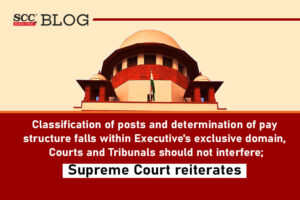Supreme Court: Exercising their appellate jurisdiction, the division bench of Ajay Rastogi and Bela M. Trivedi*, J.J., quashed the orders passed by the Delhi High Court and the Central Administrative Tribunal (‘Tribunal') and stated that both the judicial forums had committed gross error in interfering with the pay scales recommended by the Fifth Central Pay Commission in upgrading the pay scale of Junior Design Officers (‘JDOs') and making it equivalent to the pay scale of Civilian Technical Officers (‘Design') (‘CTOs').
In the matter at hand, Union of India (‘appellant') challenged the order passed by Delhi High Court which had dismissed the petition filed by the appellant and confirmed the order passed by the Tribunal.
Legal Trajectory
Indian Navy Civilian Design Officers Association (‘respondent') had challenged the decision of the appellant rejecting their representation for grant of upgradation of pay scale to Rs7500-12000 of JDOs equivalent to CTOs, consequent to the implementation of the Fifth Central Pay Commission.
Being aggrieved, the respondent preferred an appeal before the Tribunal which set aside the order passed by the appellant and directed to grant pay scale of the above-mentioned amount on a par with ‘Group B' gazette posts of CTOs from the same with all consequential benefits.
The appellant challenged the order passed by the Tribunal before Delhi High Court which dismissed the petition filed by the appellant and confirmed the order passed by the Tribunal.
Issue
Whether the Tribunal and the High Court were justified in equating the posts of JDOs with CTOs, and in fixing the pay scales of JDOs equivalent to that of CTOs, in utter disregard of the legal position settled by this Court in catena of decisions to the effect that the Courts should not interfere with the complex issues of evaluating the nature of duties and responsibilities of posts, and of fixing the pay scales, which task otherwise is best done by the expert bodies like the Pay Commission?
Court Analysis
The bench noted that the power of judicial review of the High Courts in the matter of classification of posts and determination of pay scale was no more res integra. The Court stated that it has been consistently held by this Court in plethora of decisions that equation of posts and equation of salaries was a complex matter which was best left to an expert body unless there was cogent material on record to come to a firm conclusion that a grave error had crept in while fixing the pay scale for a given post and the interference of the Court was absolutely necessary to undo the injustice.
The bench emphasised on the fact that the equation of posts and determination of pay scales was the primary function of the Executive and not of the Judiciary. Therefore, the Court should not enter upon the task of job evaluation which was generally left to the expert bodies like the pay commissions which undertake rigorous exercise for job evaluation after taking into consideration several factors like:
-
Nature of work
-
Duties
-
Accountability and responsibilities attached to the posts.
-
Extent of powers conferred on the persons holding a particular post.
-
Promotional avenues
-
Statutory rules governing the conditions of service.
-
Horizontal and vertical relativities with similar jobs etc.
The Court recognised the fact that the nature of work involved in two posts may sometimes appear to be more or less similar, however, if the classification of posts and determination of pay scale have reasonable nexus with the objective or purpose sought to be achieved, namely, the efficiency in the administration, the Pay Commissions would be justified in recommending and the State would be justified in prescribing different pay scales for the seemingly similar posts.
The Court went on to state that a higher pay scale to avoid stagnation or resultant frustration for lack of promotional avenues or frustration due to longer duration of promotional avenues was also an acceptable reason for pay differentiation.
The Court stated a well-accepted position that there could be more than one grade in a particular service. Therefore, was of the view that the classification of posts and the determination of pay structure, thus fell within the exclusive domain of the Executive, and the Courts or Tribunals should not sit in appeal over the wisdom of the Executive in prescribing certain pay structure and grade in a particular service.
The Court considered the position in the present case and stated that the duties and responsibilities of both the posts i.e., CTOs and JDOs were different, and the promotional avenues had different duration and different criteria and that there was not a single error in the fixation of the pay scales for the JDOs and CTOs, which would have justified the interference of the Tribunal.
The bench pointed out that the powers of judicial review in the matters involving financial implications were also very limited.
“The wisdom and advisability of the Courts in the matters concerning the finance, are ordinarily not amenable to judicial review unless a gross case of arbitrariness or unfairness is established by the aggrieved party.” Observes the Court.
Conclusion
With these observations, the bench quashed the orders passed by the Delhi High Court and the Central Administrative Tribunal and stated that both the judicial forums had committed gross error in interfering with the pay scales recommended by the Fifth Central Pay Commission, and in upgrading the pay scale of JDOs making it equivalent to the pay scale of CTOs.
[Union of India v. Indian Navy Civilian Design Officers Association, 2023 SCC OnLine SC 173, decided on 22-02-2023]
Judgment authored by Justice Bela M. Trivedi
Advocates who appeared in this case :
For the appellant- Senior Advocate R. Bala Subramanyam
For the respondent- Senior Advocate Salman Khurshid

